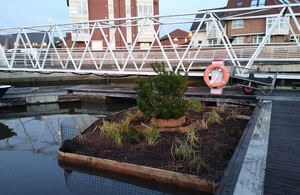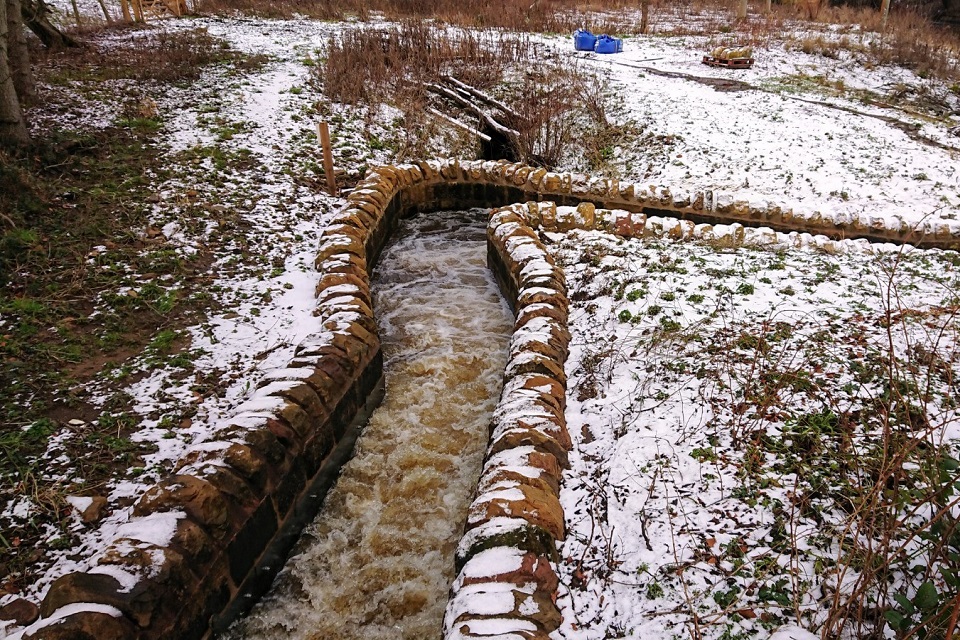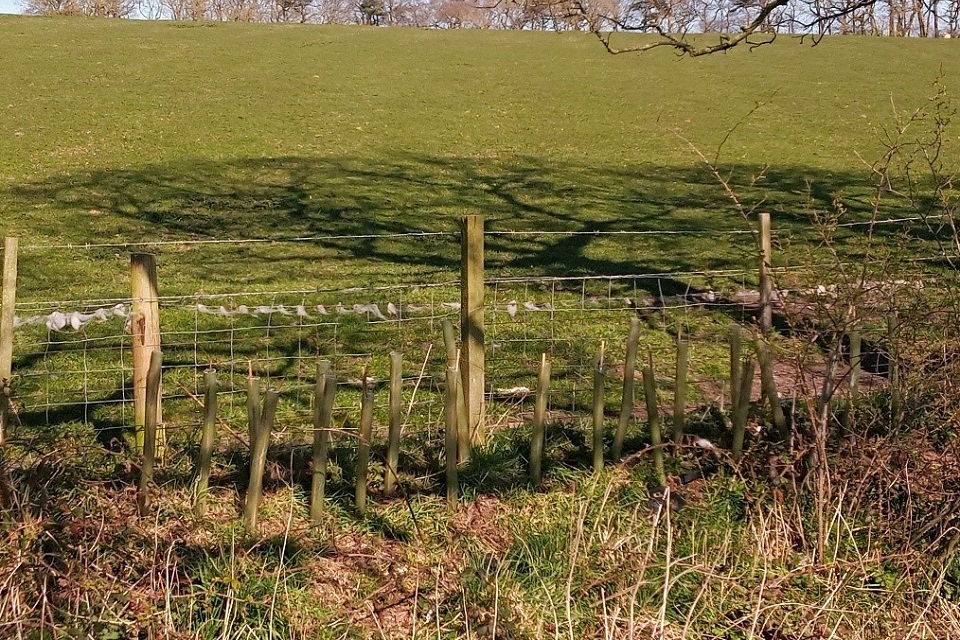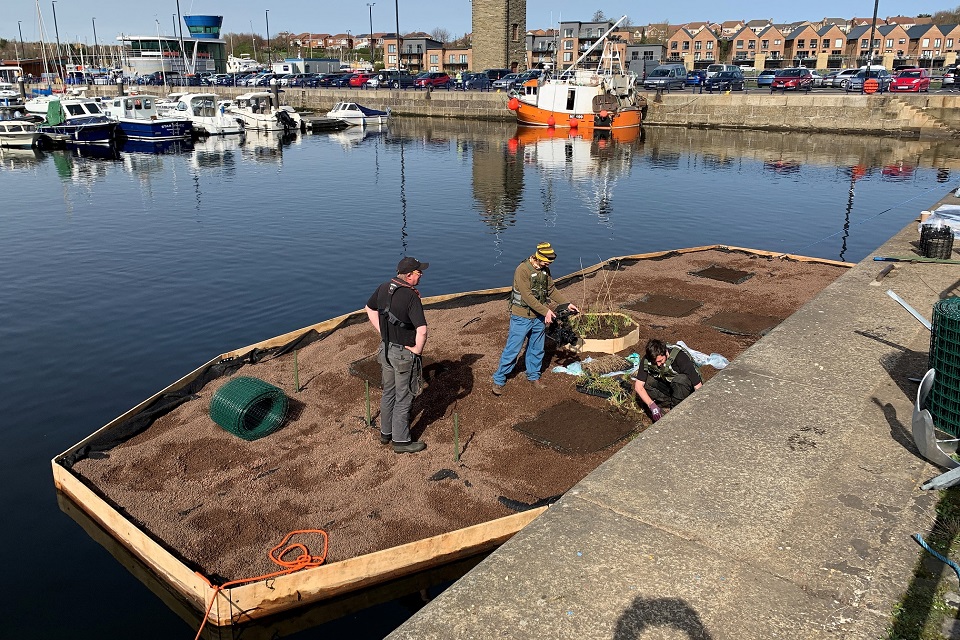More than £1m investment brings North East improvements
Almost 50 projects have been completed across the North East over the past year as part of a £1.3m programme of work to improve the environment.

Floating ecosystem at Sunderland Marina
More than 15km of river has been improved, 1,000 hectares of habitat created or improved and more than 18,000 trees planted.
In addition, 10 lakes were given a boost for fishing while 9 fish and 5 eel passage projects were completed.
The figures are released during the Environment Agency’s #WaterWarriors campaign, which launched last week and urges people to consider how their actions can affect water quality and take action to protect blue spaces for everyone.
The North East Environment Programme is managed and delivered by the Environment Agency working mainly in partnership with government backed Catchment Partnerships, bringing together river and wildlife trusts, local authorities and other organisations to improve the environment.

River Aln fish pass
Key projects delivered
There were 43 partners involved in this year’s £1.3million programme, contributing £461,000 in funding.
Key projects progressed in 2020/21 include:
- Identifying actions to reduce the growth of macroalgae at coastal streams at Holy Island, Northumberland, which poses a risk to key protected habitats and internationally important wildlife.
- A study carried out and design options produced for ecological enhancements at Blyth estuary, Northumberland.
- Improvements across the Northumberland Coquet catchments to reduce pollution run off from land, which has seen 3,500 trees planted, thousands of metres of new fencing installed and advice given to 150 landowners.
- Completion of a two-year project to improve fish and eel passage on the River Aln, Northumberland, along with restoration involving 2,450 trees planted and work with 100 landowners to reduce pollution run off from land.
- Planting almost 7,000 trees and hedgerows along a 1km stretch of the Upper Ouseburn, north of Newcastle, to provide habitat and reduce sediment pollution into the river.
- Innovative estuary improvements at pilot sites on the Tyne and Wear, which includes floating ecosystems.
- The final year of a four-year woodland restoration project in Durham which has seen 4,875 trees planted, creating 3.3hectrares of new woodland.
- Improved access and the installation of a new classroom to improve coaching and boost family fishing opportunities at Tilery Pond at Hartlepool.
- Improvements at Langley Beck on the River Tees catchment near Staindrop, including improved connectivity to the beck for fish and addressing diffuse pollution issues.

Trees planted at the Upper Ouseburn
North East ‘is a far richer place’
Catherine Saxon, North East Area Director for the Environment Agency, said:
From removing obstructions to allow fish to move further up our watercourses and reach their natural spawning grounds, to interventions to reduce the amount of sediment entering our rivers, and innovative techniques to create floating ecosystems in our estuaries, the environment in the North East is a far richer place following the delivery of last year’s projects.
The Environment Agency’s #WaterWarriors campaign is highlighting the work our teams do on a daily basis to monitor and improve water quality. Working together in partnership means we can share expertise and deliver more for less and these successes would not have been possible without the hard work and dedication of all those involved.
But it’s important to remember that individual actions really do count. Small actions can have a damaging impact on water quality and there are some simple steps we can all take to make a difference.

Floating ecosystem at Royal Quays
Public urged to be #WaterWarriors
With 4 out of 5 people expected to take a #GreatBritishStaycation this summer, it’s more important than ever that we are all #WaterWarriors and protect the quality of our waters and beaches for everyone to enjoy.
- Whether you are at home or away this summer, become a #WaterWarrior by taking small steps to protect water quality such as:
- Only flush the 3Ps – pee, poo and paper
- never pouring fats and oils down the sink
- never flushing wet wipes and sanitary products down the loo
- always taking your rubbish away from the beach
- always bagging and binning your dog’s poo
- never pouring waste liquids or throwing litter down surface water drains
The campaign is also urging people visiting beaches, lakes and rivers to ‘know before you go’ by checking the Environment Agency’s Swimfo website which provides instant, easy access to information on over 400 bathing waters in England, including the latest water quality classification – and, for some bathing waters, when warnings are issued due to the temporary effects on water quality after a rainy day or high tides.
Having this information at the fingertips ensures people have the most up-to-date information before they take the plunge. Joint advice with Public Health England is also available on open water swimming – that’s swimming anywhere that isn’t a public pool - at Swim healthy